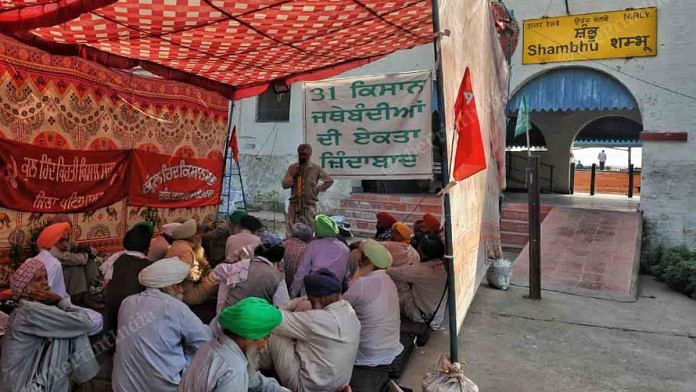Shambhu (Punjab): Punjab’s agitating farmers make no bones of why the Shambhu railway station is one of their key protest sites. Located at the Punjab-Haryana border, the station is the gateway to not just the state but a large swathe of the northern region.
“Any train that wants to cross Punjab to go to Himachal Pradesh, or Rajasthan or even Jammu and Kashmir has to cross this station,” said Hajura Singh of the Bharatiya Kisan Union (Rajewal). “If the doorway is shut only then will Punjab be shut off from the rest of the country.”
The farmers have been here ever since 1 October, to protest the three contentious farm bills passed by the Modi government on 26 September.
They have so far made some concessions — they’ve moved away from the railway tracks to outside the station and have agreed to the passage of freight trains. The farmers, however, refuse to allow the passage of passenger trains until the Modi government revokes the three farm legislations.
“We blocked the tracks on 1 October, which continued until 22 October. But all 30 farmer organisations decided to vacate the tracks on the 22nd evening to allow the passage of freight trains,” Hajura Singh said. “We then moved our protest to the platform. But on 5 November, we have moved the protest outside the station to show the central government that we are not blocking the tracks and they can resume freight trains but we won’t allow passage of passenger trains.”

Tracks empty but impasse with Centre continues
While the 30 farmer organisations have decided to move away from the tracks to allow the movement of freight trains bringing in essential supplies, the central government has refused to resume train services.
On Saturday, the Railway Ministry issued a statement saying that freight trains will resume operations only if all trains are allowed to pass into Punjab.
“The restriction on the types of trains, routes, destination and cargo etc. are impossible to adhere to and create huge uncertainty and risk to the life and safety of our Railway personnel and property,” the statement said.
On the same day, Railway Minister Piyush Goyal tweeted, “Urge Punjab Govt to ensure full safety and security of the entire Railways system and allow running of all trains through and to Punjab so that goods and passenger trains can serve the people of Punjab.”
Urge Punjab Govt to ensure full safety and security of entire Railways system and allow running of all trains through and to Punjab so that goods and passenger trains can serve the people of Punjab.
— Piyush Goyal (@PiyushGoyal) November 7, 2020
On Friday, the Punjab government sought to address the situation announcing that all 30 farmer organisations that had organised the ongoing rail roko protests, have decided to clear rail tracks to allow the movement of goods trains.
Farmers said that the only reason they are not allowing passenger trains, is to drive home their point to the Modi government. “We are only sitting here to make our voices heard that the three farm acts need to be revoked. Why else will we leave our fields, jeopardise the welfare of the people of Punjab and sit here,” said Ranjit Singh of the Indian Farmers Association. “The moment they revoke these laws, we will stop our protest.”
The three contentious bills
The farmers opposition is to the three contentious farm legislation — the Farmers’ Produce Trade and Commerce (Promotion and Facilitation) Act, 2020, which allows farmers to sell their produce outside Agricultural Produce Marketing Committees (APMC) constituted by different state legislations. The Farmers (Empowerment and Protection) Agreement on Price Assurance and Farm Services Act, 2020, which allows contract farming, and the Essential Commodities (Amendment) Act, 2020, which deregulates the production, supply, distribution of food items like cereals, pulses, potatoes, onion and edible oilseeds.
The farmers said that the bills allow private companies monopoly over their land. “According to these laws our mandis won’t be there, private companies can do contract farming on our land and we won’t even get the fair price that we get under the MSP system because they will procure our produce for a price that’s much lesser than MSP. Why should we give our land to the corporates and become their slaves?” asked Charanjeet Singh, BKU (Rajewal).
Farmers said that the central government’s assurance that the MSP system will continue is not enough. “The central government should amend the new laws to include the provision that if the farmers are not paid MSP, then there should be a penalty,” said Hajura Singh. “The government should also procure the produce that is leftover and not bought by the private players so that we are protected.”
While the BJP has accused the farmers of being “naxal forces”, the farmers said their protest will continue to be peaceful until the laws are revoked. “Even on the day of the chakka jam, people kept alluding that the protest will get violent but it did not,” said Darbara Singh of the All India Farmers Association. “This protest will not get violent like the partition of India and Pakistan or division of Punjab or even 1984. We will remain peaceful and continue our protest until the three laws are revoked.”
Also read: Power crisis, urea shortage, piled-up grain stock — how goods train suspension has hit Punjab




Its Sangrur, not Shambhu. Please fact-check before posting.